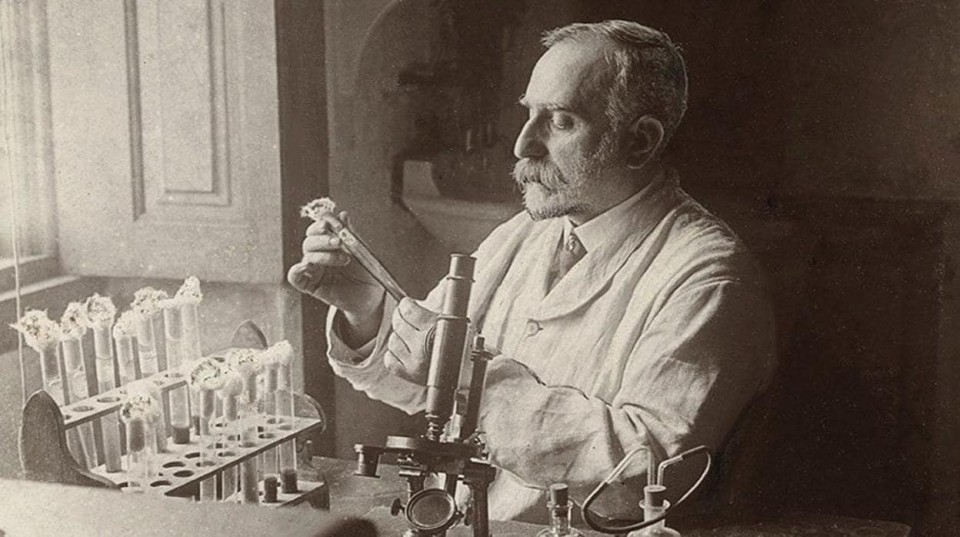Blog
Remembering Jaume Ferran i Clua
Jueves, 12 de december de 2024Pioneer of vaccinology
Jaume Ferran i Clua (1851-1929), born in Corbera d’Ebre (Tarragona), was a physician and bacteriologist who pioneered vaccine research. He studied Medicine at the University of Barcelona, standing out for his interest in bacteriology and the use of innovative techniques, such as photography to document bacterial cultures.
Discoveries and contributions:
1. Cholera vaccine (1885): Ferran developed the first effective vaccine against this disease, based on Robert Koch’s discoveries about the cholera bacillus and Louis Pasteur’s vaccination methods. This vaccine was tested on more than 30,000 people with a low mortality rate, but it generated scientific and political controversies in Spain, pitting him against figures such as Santiago Ramón y Cajal. However, in 1907 he was awarded the Bréant Prize by the Académie des Sciences in Paris for his work.
2. Rabies vaccine (1887): Inspired by Pasteur, he designed a more intensive methodology for immunization, which required less time. He also promoted the creation of the Municipal Microbiological Laboratory of Barcelona, consolidating leadership in the research of infectious diseases.
3. Tuberculosis vaccine (1919): Although he worked for years in this field, he faced limitations in resources and recognition. He achieved important advances with an experimental vaccine and published several studies on Koch's bacillus and tuberculosis.
4. Other works: He carried out research on typhoid fever, diphtheria and influenza, developing vaccines and exploring new methods of prevention and treatment.
Legacy:
Despite criticism and difficulties, Ferran is remembered as a pioneer of vaccinology in Spain. He was honored with awards and tributes both during his lifetime and posthumously, and his work laid important foundations in the fight against infectious diseases. He died in Barcelona in 1929, leaving a legacy of scientific innovation and humanism in medicine.
Anecdote
Jaume Ferran i Clua starred in a curious anecdote during the development of his cholera vaccine, which demonstrates his determination and scientific creativity in a difficult context.
In 1884, after a cholera epidemic in Marseille and Toulon, Ferran was sent by the Barcelona City Council to investigate the outbreak. There, using Pasteur's methods and based on the findings of Robert Koch, he managed to isolate cholera bacteria. However, since transporting live bacteria was complicated and regulations prohibited it, Ferran made an ingenious decision: he hid the bacterial samples in his own socks so that he could bring them to Barcelona without being detected. This bold action allowed him to return with the cultures necessary to develop the vaccine, which he successfully tested in 1885
This episode not only shows his creativity in the face of adversity, but also his commitment to scientific research, despite the initial opposition and the controversies that his work generated in Spain.
-
CHRISTMAS BROADWAY
Concert dedicated to the greatest Broadway hits in their Christmas version
See more -
BLACK FRIDAY
10% discounts% all activities
See more -
STERNALIA'S DONATIONS TO THE ANIMAL SHELTER CENTRE D'ACOLLIDA D'ANIMALS DE COMPANYIA OF BARCELONA (CAACB)
OUR COMMITMENT AS A LOCAL COMPANY FOR THE IMPROVEMENT OF THE CITY.
See more -
ENJOY WHILE LERNING
Courses, theatre, sensory experimentation, historical recreation and music. A summary of our didactic proposal beyond the guided tours.
See more -
The women hidden behind the heritage spaces of Barcelona
It's no secret that history has traditionally been given male names to tell, leaving women in the background.
See more















.png)
.png)



![[...]](https://www.sternalia.com/xtra/imgs/loading.gif)